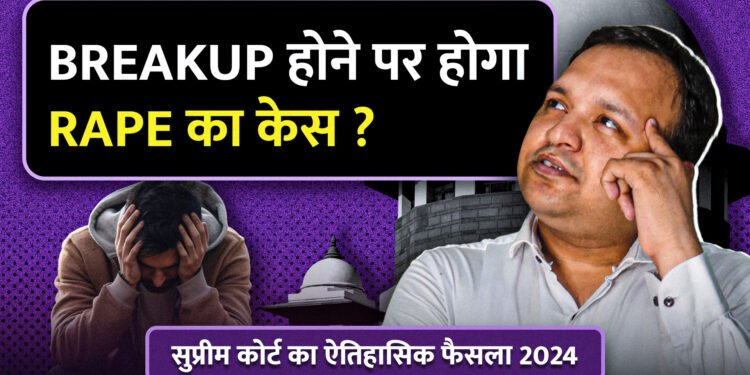Introduction
In a landmark ruling, the Supreme Court of India has addressed a critical issue surrounding false rape allegations arising from the promise of marriage. In the case of Mahesh Damu Khare v. The State of Maharashtra & Anr., the Court highlighted the importance of distinguishing between consensual relationships and those based on false promises, especially when the relationship involves prolonged physical intimacy. This judgment not only provides clarity on how false rape allegations related to unfulfilled marriage promises should be treated but also serves as a warning against misusing criminal law to settle personal disputes.
To learn more about the topic, read the blog till the end, and if there lies any more doubt, feel free to reach out to us at; https://thelegalshots.com/legal-opinion/
Facts of the Case
The complainant, a widow, filed an FIR in 2018 accusing the appellant, Mahesh Damu Khare, of having sexual relations with her under the pretext of a false promise of marriage. According to the complainant, their relationship began in 2008, during which the appellant allegedly promised to marry her. The physical relationship between the parties continued for several years, and during this period, the appellant is said to have provided financial support to the complainant. However, when the appellant later ceased providing financial assistance and refused to marry the complainant, she filed a complaint alleging rape, cheating, and other charges.
The appellant, on the other hand, contended that the relationship was consensual and that the complainant was aware that he was already married. He argued that the complainant’s allegations were made after the termination of financial support, suggesting the charges were an afterthought.
The Supreme Court, upon reviewing the facts, quashed the FIR, holding that no prima facie case of rape was made out against the appellant. The Court emphasized that the longer the duration of a physical relationship without the female partner’s insistence on marriage, the more likely it is to indicate consent rather than a relationship based on a false promise of marriage.
Supreme Court’s Observations
The Bench, comprising Justice B.V. Nagarathna and Justice Nongmeikapam Kotiswar Singh, quashed the FIR, ruling that the allegations did not constitute a prima facie case of rape. It noted a “worrying trend” of criminalizing consensual relationships post facto.
The Court remarked, “If criminality is to be attached to such prolonged physical relationships at a very belated stage, it can lead to serious consequences… It will open the scope for imputing criminality to long-term relationships after they turn sour.”
False Rape Charges and the Misuse of Promises of Marriage
False rape charges, particularly those involving promises of marriage, have become a worrying trend in India. In many cases, individuals who have been in consensual relationships later use the criminal justice system to seek retribution after the relationship ends. Such cases often arise when one party feels wronged due to the unfulfilled promise of marriage, leading to the wrongful criminalization of consensual acts.
The Supreme Court’s judgment in this case provides much-needed clarity on how to approach these allegations. The Court underlined that the longer the relationship, the more likely it is to be consensual, and the less likely it is that a false promise of marriage was the driving force behind the physical intimacy. This ruling is a reminder that relationships should not be criminalized simply because they end, especially when there is no evidence of coercion or deceit.
Laws Explained
The judgment hinged on two key aspects of law:
- Section 376 of IPC (Rape): For a physical relationship to constitute rape under the pretext of marriage, it must be proven that the promise of marriage was a deliberate lie, made to obtain consent.
- Abuse of Criminal Process: The Court expressed concern over the increasing trend of criminalizing consensual relationships after they turn sour, terming such cases an abuse of legal provisions.
The Court reaffirmed that criminality cannot be attached to relationships that were consensual at the outset but later deteriorated due to personal conflicts.
Conclusion
The Supreme Court’s decision in Mahesh Damu Khare v. The State of Maharashtra & Anr. sends a strong message about the importance of distinguishing between consensual relationships and those based on criminal deceit. This judgment clarifies that prolonged relationships without coercion or protest cannot be automatically classified as rape or cheating. It also emphasizes that using the criminal justice system to resolve personal grievances can undermine the fairness of legal proceedings.
My Point of View
This ruling is a significant step toward safeguarding the integrity of criminal law. It highlights the need for judicial prudence when dealing with cases where personal relationships are intertwined with legal claims. While the Court’s decision aims to prevent the misuse of rape and cheating laws, it also stresses the need for evidence and proper legal scrutiny in such cases. The judgment serves as a reminder that criminal proceedings should not be used as a tool to resolve civil disputes or to penalize individuals who were in a consensual relationship.
Takeaways for Readers
- Consent matters: The Court has emphasized that consent is the key factor in distinguishing between consensual relationships and those based on false promises.
- Criminal law is not a tool for personal vendettas: The Court’s concern about misusing criminal law for personal gain is an important takeaway.
- Beware of false promises: While the Court has quashed the charges in this case, the judgment highlights the importance of understanding the legal implications of making false promises, especially regarding marriage.
- Don’t rush to criminalize relationships: Relationships that turn sour should not immediately lead to criminal charges unless there is sufficient evidence of wrongdoing.
If doubts still persist, contact our Legal Experts at https://thelegalshots.com/legal-opinion/




